1061 scholarly books by Catholic University of America Press and 21
start with N
1061 scholarly books by Catholic University of America Press and 21
1061 scholarly books by Catholic University of America Press
21 start with N start with N
21 start with N start with N
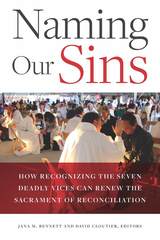
Naming Our Sins
How Recognizing the Seven Deadly Vices can Renew the Sacrament of Reconciliation
Jana Bennett
Catholic University of America Press, 2019
What would it take to renew our ability to name our sins in a meaningful and pertinent way? Naming sins is a particularly important task for Catholic moral theology, but it is one that often falls back into a paradigm of simple violations of rules. While laws and commandments are essential, Vatican II’s universal call to holiness and the revival of virtue ethics require moving further. Yet in part because moral theologians today tend to be lay people, not priests, there has been a de-emphasis on the confession of sins. Contemporary questions like poverty, racism, and abortion are usually connected to questions about sin in some way, but they are disconnected from the idea of naming specific sins in the sacrament of penance. Lay moral theologians raise these issues in a way that makes clear their implications for a parish social justice committee (or the voting booth), but not their implications for the naming of sins in the sacrament of reconciliation. Naming Our Sins proposes to re-make that connection: the moral theologian’s task of helping people name individual sins needs to be restored, though in ways distinctive from dominant pre-Vatican II notions.
In this volume, editors Jana Bennett and David Cloutier gather some of the best of the current generation of moral theologians in order to reflect on the classic tradition of the vices. It is crucial to the Christian understanding of sin that we recognize (a) we bear at least some responsibilities for injuries, and (b) God wants us to participate in the process of healing and conversion. Neither the sin itself nor the healing simply come from somewhere else; the task of naming sins enlists us as mature, growing disciples.
Each chapter takes on a different classical vice, describing the vice, exploring its dimensions in contemporary experience, and moving the reader toward naming specific sins that arise from the vice. The concluding chapters from Catholic priests explore two basic dimensions of the sacrament of penance: liturgical and communal.
[more]
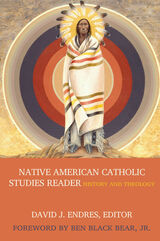
Native American Catholic Studies Reader
History and Theology
David J. Endres
Catholic University of America Press, 2022
Before there was an immigrant American Church, there was a Native American Church. The Native American Catholic Studies Reader offers an introduction to the story of how Native American Catholicism has developed over the centuries, beginning with the age of the missions and leading to inculturated, indigenous forms of religious expression. Though the Native-Christian relationship could be marked by tension, coercion, and even violence, the Christian faith took root among Native Americans and for those who accepted it and bequeathed it to future generations it became not an imposition, but a way of expressing Native identity.
From the perspective of historians and theologians, the Native American Catholic Studies Reader offers a curated collection of essays divided into three sections: education and evangelization; tradition and transition; and Native American lives. Contributors include scholars currently working in the field: Mark Clatterbuck, Damian Costello, Conor J. Donnan, Ross Enochs, Allan Greer, Mark G. Thiel, and Christopher Vecsey, as well as selections from a past generation: Gerald McKevitt, SJ, and Carl F. Starkloff, SJ.
These contributions explore the interaction of missionaries and tribal leaders, the relationship of traditional Native cosmology and religiosity to Christianity, and the role of geography and tribal consciousness in accepting and maintaining indigenous and religious identities. These readings highlight the state of the emergent field of Native-Catholic studies and suggest further avenues for research and publication.
For scholars, teachers, and students, the Native American Catholic Studies Reader explores how the faith of the American Church’s eldest members became a means of expressing and celebrating language, family, and tribe.
[more]
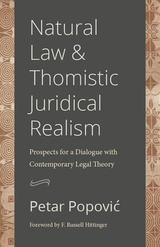
Natural Law and Thomistic Juridical Realism
Prospects for a Dialogue with Contemporary Legal Theory
Petar Popovic
Catholic University of America Press, 2022
This book proposes a rather novel legal-philosophical approach to understanding the intersection between law and morality. It does so by analyzing the conditions for the existence of a juridical domain of natural law from the perspective of the tradition of Thomistic juridical realism. In order to highlight the need to reconnect with this tradition in the context of contemporary legal philosophy, the book presents various other recent jurisprudential positions regarding the overlap between law and morality. While most authors either exclude a conceptual necessity for the inclusion of moral principles in the nature of law or refer to the purely moral status of natural law at the foundations of the legal phenomenon, the book seeks to elucidate the essential properties of the juridical status of natural law. In order to establish the juridicity of natural law, the book explores the relevant arguments of Thomas Aquinas and some of his main commentators on this issue, above all Michel Villey and Javier Hervada. It establishes that Thomistic juridical realism observes the juridical phenomenon not only from the perspective of legal norms or subjective individual rights, but also from the perspective of the primary meaning of the concept of right (ius), namely, the just thing itself as the object of justice. In this perspective, natural rights already possess a fully juridical status and can be described as natural juridical goods. In addition, from the viewpoint of Thomistic juridical realism, we can identify certain natural norms or principles of justice as the juridical title of these rights or goods. The book includes an assessment of the prospective points of dialogue with the other trends in Thomistic legal philosophy as well as with various accounts of the nature of law in contemporary legal theory.
[more]
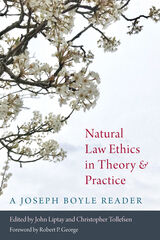
Natural Law Ethics in Theory and Practic
A Joseph Boyle Reader
Joseph Boyle
Catholic University of America Press, 2020
Natural Law Ethics in Theory and Practice brings together a selection of essays of the late Joseph Boyle. Boyle was, with Germain Grisez and John Finnis, a founder and developer of the New Classical Natural Law Theory, arguably the most important development in Catholic moral philosophy of the twentieth century. While this theory is indebted to the work of St. Thomas Aquinas, it incorporates an understanding and assessment of that work that is different from that found in other statements of natural law. Boyle made crucial contributions to a wide variety of aspects of this theory, and the volume is divided into two parts.
Part One: Articulating a Theory of Natural Law contains three sections in which Boyle defends the reality of free choice and the view that the basic reasons for action, or first principles of natural law, are incommensurable in goodness. Boyle identifies the basic moral standard for choice and action, and develops an account of human action that elucidates the important role played by intention and double effect in their moral evaluation.
The essays in Part Two: Natural Law Theory and Contemporary Moral Problems demonstrate the strength and scope of Boyle’s natural law account, as he brings it to bear upon just war theory, property and welfare rights, and issues in bioethics. The essays in bioethics address the difficult question of whether it is appropriate to tube-feed patients in persistent vegetative state, and include an unpublished essay, “Against Assisted Death,” which he delivered as the Anscombe Lecture at The Anscombe Bioethics Centre in Oxford about a year before he died.
This volume also includes a Foreword by Princeton’s Robert P. George; an Introduction by the editors that highlights Boyle’s contribution to the development of the new classical natural law theory; and a bibliography of Boyle’s publications.
Part One: Articulating a Theory of Natural Law contains three sections in which Boyle defends the reality of free choice and the view that the basic reasons for action, or first principles of natural law, are incommensurable in goodness. Boyle identifies the basic moral standard for choice and action, and develops an account of human action that elucidates the important role played by intention and double effect in their moral evaluation.
The essays in Part Two: Natural Law Theory and Contemporary Moral Problems demonstrate the strength and scope of Boyle’s natural law account, as he brings it to bear upon just war theory, property and welfare rights, and issues in bioethics. The essays in bioethics address the difficult question of whether it is appropriate to tube-feed patients in persistent vegetative state, and include an unpublished essay, “Against Assisted Death,” which he delivered as the Anscombe Lecture at The Anscombe Bioethics Centre in Oxford about a year before he died.
This volume also includes a Foreword by Princeton’s Robert P. George; an Introduction by the editors that highlights Boyle’s contribution to the development of the new classical natural law theory; and a bibliography of Boyle’s publications.
[more]
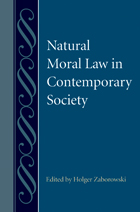
Natural Moral Law in Contemporary Society
Holger Zaborowski
Catholic University of America Press, 2010
The essays of this volume examine natural moral law, different natural law theories, and the role that natural law can and should play in our contemporary society
[more]
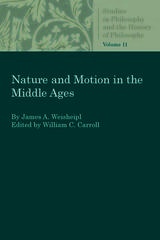
Nature and Motion in the Middle Ages
James A. Weisheipl
Catholic University of America Press, 2018
The essays contained in this volume illustrate the work of Fr. James A. Weisheipl, whose writing and teaching have resulted in important additions to our understanding of nature and motion.
[more]
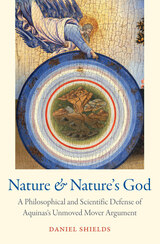
Nature and Nature's God
A Philosophical and Scientific Defense of Aquinas' Unmoved Mover Argument
Daniel Shields
Catholic University of America Press, 2023
Aquinas’ first proof for God’s existence is usually interpreted as a metaphysical argument immune to any objections coming from empirical science. Connections to Aquinas’ own historical understanding of physics and cosmology are ignored or downplayed. Nature and Nature's God proposes a natural philosophical interpretation of Aquinas’ argument more sensitive to the broader context of Aquinas’ work and yielding a more historically accurate account of the argument. Paradoxically, the book also shows that, on such an interpretation, Aquinas’ argument is not only consistent with modern science, but actually confirmed by the history of science, from classical mechanics through 19th century thermodynamics to contemporary cosmology.
The first part of the book considers Aquinas’ argument in its historical context, exploring the key principles that everything in motion is moved by something else and that an infinite regress of causes is impossible. The structure of the First Way is analyzed and the argument is connected both with Aquinas’ Third Way—a new interpretation of which is also proposed—and Aquinas’ second proof from motion in the Summa contra Gentiles. To complete the account of what natural philosophy—prior to metaphysics—can demonstrate about God, a chapter on Aquinas’ teleological argument (the Fifth Way) is also included.
The second part of the book tracks the history of modern science from Copernicus to today, showing how Aquinas’ argument fared at each major turn. The first chapter shows how Newton’s understanding of inertia and conservation of momentum supports the idea that motion cannot continue forever without God’s causality, and integrates a modern understanding of inertia and gravity with the principles of Thomistic natural philosophy. The second chapter considers the first and second laws of thermodynamics, showing how they too support Aquinas’ contention that motion cannot continue forever without God’s causality. This chapter also discusses statistical mechanics and contemporary cosmology, demonstrating that science continues to support Aquinas’ unmoved mover argument. The final chapter turns to modern biology as well as cosmological fine-tuning to show that modern science also continues to support Aquinas’ teleological argument. The result is not only a satisfying defense of Aquinas’ natural philosophical proofs for God’s existence, but a primer on the broader project of integrating Thomistic natural philosophy with modern science.
[more]
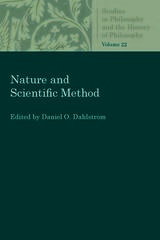
Nature and Scientific Method
Daniel O. Dahlstrom
Catholic University of America Press, 2018
The present volume is a collection of systematic and historical studies addressing the terms of Aristotelian inference.
[more]
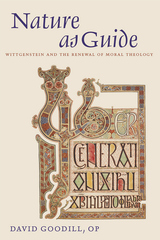
Nature as Guide
Wittgenstein and the Renewal of Moral Theology
David Goodill, OP
Catholic University of America Press, 2022
Wittgenstein influenced a generation of philosophers and theologians, with works such as Fergus Kerr’s Theology After Wittgenstein showing the relevance of Wittgenstein’s philosophy for contemporary questions in theology. Nature as Guide follows many of the insights of this earlier generation of Wittgenstein influenced scholars, to bring Wittgenstein into conversation with contemporary Catholic moral theology.
The first four chapters of the book provides a reading of key themes in Wittgenstein’s philosophy, and draw among others on G.E.M. Anscombe to situate Wittgenstein in relation to the Platonic tradition. Understanding the relationship between grammar, metaphysics and nature is central to this tradition and these themes are examined through an account of Wittgenstein’s philosophical development. These four chapters also provides a critical perspective on Wittgenstein’s thought, engaging with the criticisms of Wittgenstein offered by philosophers such as Rhees Rush and William Charlton.
Chapter five lays the groundwork for a dialogue between Wittgenstein and moral theology. Firstly, by examining how open Wittgenstein’s philosophy is to dialogue with theology, and secondly through proposing the use of Servais Pinckaers’ definition of moral theology to structure the conversation developed in subsequent chapters.
Pinckaers’ definition is based upon St Thomas Aquinas’ presentation of the principles of human acts in the Prima Secundae of the Summa Theologiae and the final three chapters focus on the question of human acts and their basis in human nature. The reading of Wittgenstein developed in the first part of the book is brought into dialogue with the tradition of Catholic moral theology represented by Pinckaers and other students of St Thomas, such as Anscombe, Josef Pieper, Herbert McCabe, Jean Porter and Alasdair MacIntyre. The book finishes with McCabe’s account of the transformation of human nature through God’s Word, showing how Wittgenstein’s understanding of human practices can shed light on the life of grace.
[more]
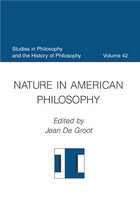
Nature in American Philosophy (Studies in Philosophy and the History of Philosophy, Volume 42)
Jean De Groot
Catholic University of America Press, 2004
With its focus on philosophy of nature, this book fills a gap in the ongoing reassessment of nineteenth-century American philosophy, and it opens the way to further study of the role played by reflection on nature in the emergence of the American mind.
[more]
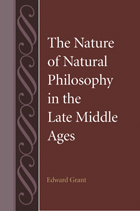
The Nature of Natural Philosophy in the Late Middle Ages (Studies in Philosophy and the History of Philosophy, Volume 52)
Edward Grant
Catholic University of America Press, 2010
In this volume, distinguished scholar Edward Grant identifies the vital elements that contributed to the creation of a widespread interest in natural philosophy, which has been characterized as the "Great Mother of the Sciences."
[more]
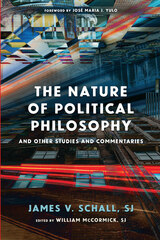
The Nature of Political Philosophy
And Other Studies and Commentaries
James V. Schall
Catholic University of America Press, 2022
In his final collection of essays, Father Schall explores the life of faith across a dazzling array of subjects, from Martin Luther to bioethics. With his characteristic patience, brilliance, and careful tenacity, Father Schall interrogates profoundly what it means to try to be a citizen of the Kingdom of God in the city of Man. Never shying away from controversy, across 14 articles and 4 book reviews Father Schall investigates the critical themes of his life and scholarship: reason and revelation; the nature of modernity; literature and salvation; metaphysics and politics; and much more.
Whether the reader is new to Father Schall or a longtime student, this posthumously-published collection of essays offers a profound meditation on the nature of political philosophy, and particularly what it would mean for Catholicism to offer a political philosophy. From such fundamental considerations, Schall explores ethical, literary and legal themes, displaying his typical breadth and depth of engagement with all that is real.
Ultimately, Father Schall leads one on a Socratic enterprise, an education whereby one comes to question for oneself basic assumptions, and to dig deeper into the first principles as they are recalled in the orders of knowledge and being. While Father Schall has passed on to his reward, this collection of essays helps ensure that his lessons continue to guide, challenge and enrich students for generations to come.
[more]
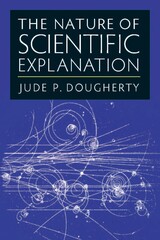
The Nature of Scientific Explanation
Jude P. Dougherty
Catholic University of America Press, 2013
In his newest work, distinguished philosopher Jude P. Dougherty challenges contemporary empiricisms and other accounts of science that reduce it to description and prediction.
[more]
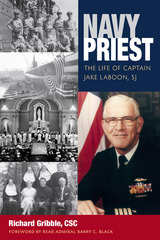
Navy Priest
Richard Gribble
Catholic University of America Press, 2015
Navy Priest is a compelling biography of the Jesuit priest and Navy chaplain John Francis (Jake) Laboon. Father Jake made a significant contribution to the United States Navy, both as a World War II submarine officer and, most prominently, during a 22-year career as a chaplain. Laboon served as the first chaplain for the Fleet Ballistic Missile Submarine Program, but also served as chaplain at his alma mater the United States Naval Academy, undertook a tour of duty with the US Marines in Vietnam, where he was awarded the Legion of Merit, and later served as Fleet Chaplain of the United States Atlantic Fleet.
[more]
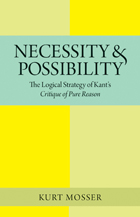
Necessity and Possibility
The Logical Strategy of Kant's Critique of Pure Reason
Kurt Mosser
Catholic University of America Press, 2008
Kurt Mosser argues that reading Kant's Critique of Pure Reason as an argument for such a logic of experience makes more defensible many of Kant's most controversial claims, and makes more accessible Kant's notoriously difficult text.
[more]
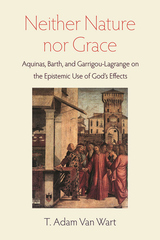
Neither Nature nor Grace
Aquinas, Barth, and Garrigou-Lagrance on the Epistemic Use of God's Effects
T. Adam Van Wart
Catholic University of America Press, 2021
Neither Nature nor Grace operates at the intersection of systematic and philosophical theology, exploring in particular how St. Thomas Aquinas variously uses the latter in service to the clarification and faithful advancement of the former. More specifically, Neither Nature nor Grace explores the overlooked logical difficulties that have followed the late modern debates in ecumenical Christian theology as to whether knowledge of God is available solely through God’s gracious self-revelation (e.g., Jesus Christ and Holy Scripture), or through revelation and the deliverances of natural reason. Van Wart takes the prominent French Dominican Reginald Garrigou-Lagrange as paradigmatic for the case that knowledge of God can be had by both revelation and natural reason. Representing the opposing position, that God can only be known through divine revelation, Van Wart highlights the work of influential Protestant theologian Karl Barth. By placing these two imposing 20th century theologians in conversation, and by providing a careful theo-philosophical analysis of the logical mechanics of each thinker’s respective arguments, Van Wart shows how both inadvertently overreach their self-professed epistemological bounds and just so run into significant problems maintaining the coherence of their relative theological positions. That is, against their expressed intentions to the contrary, both thinkers unwittingly evacuate the divine essence of the mystery Christian tradition has always previously claimed it to have, effectively reducing the being of God to mere creaturely being writ large. As a contrasting corrective to this problem, Van Wart proffers a constructive grammatical reading of Aquinas’s measured account of the crucial but often overlooked logical differences between what can be said of the divine, on the one hand, versus what can be known of God, on the other. While many recent works have attempted to solve the ongoing arguments which Garrigou-Lagrange and Barth epitomize regarding the epistemic use of God’s effects, Van Wart’s contribution constructively pushes the conversation to a different level in showing how Aquinas’s grammar of God provides a salutary means of dissolving and moving beyond these contentious debates altogether.
[more]
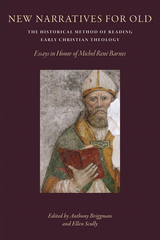
New Narratives for Old
The Historical Method of Reading Early Christian Theology: Essays in Honor of Michel Rene Barnes
Anthony Briggman
Catholic University of America Press, 2022
Guilds and conferences have grown up around historical theology, yet no volume has ever been dedicated to the definition and illustration of the method undergirding historical theology. This volume both defines and illustrates the methodology of historical theology, especially as it relates to the study of early Christianity, and situates historical theology among other methodological approaches to early Christianity, including confessional apologetics, constructive theology, and socio-cultural history.
Historical theology as a discipline stands in contrast to these other approaches to the study of early Christianity. In contrast to systematic or constructive approaches, it remains essentially historical, with a desire to elucidate the past rather than speak to the present. In contrast to socio-historical approaches, it remains essentially theological, with a concern to value and understand the full complexity of the abstract thought world that stands behind the textual tradition of early Christian theology. Moreover, historical theology is characterized by the methodological presupposition that, unless good reason exists to think otherwise, the theological accounts of the ancient church articulate the genuine beliefs of their authors.
The significance of this volume lies in the methodological definition it offers. The strength of this volume lies in the fact that its definition of the historical method of studying theology is not the work of a single mind but that of over twenty respected scholars, many of whom are leaders in the field. The volume begins with an introductory essay that orients readers to various approaches to early Christian literature, it moves to two technical essays that define the historical method of studying early Christian theology, and then it illustrates the practice of this method with more than twenty essays that cover a period stretching from the first century to the dawn of the seventh.
[more]
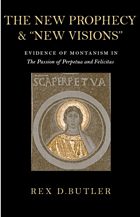
The New Prophecy and "New Visions"
Evidence of Montanism in The Passion of Perpetua and Felicitas (Patristic Monograph Series, Volume 18)
Rex D. Butler
Catholic University of America Press, 2006
In this book, Rex D. Butler examines the Passion for evidence of Montanism and proposes that its three authors--Perpetua, Saturus, and the unnamed editor--were Montanists.
[more]
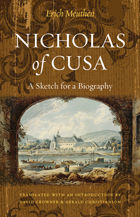
Nicholas of Cusa
A Sketch for a Biography
Erich Meuthen
Catholic University of America Press, 2010
This translation of Erich Meuthen's well-known biography of Nicholas of Cusa presents the foremost summary of Cusanus's life and thought. F
[more]

Nicholas of Cusa's On Learned Ignorance
A Commentary on De docta ignorantia
Karsten Harries
Catholic University of America Press, 2024
This is the first commentary to have been written on Nicholas of Cusa's most famous work, On Learned Ignorance. This fact testifies to the difficulty of what has long been recognized to be the most significant philosophical text produced by the Renaissance. While there are many passages in the work that can be cited in support of Cassirer's celebration of Cusanus as the first modern philosopher, that judgment is challenged by the way his work is rooted in a faith and a tradition likely to strike us as thoroughly medieval. This commentary shows how closely the two are linked. Despite the many ways in which what the cardinal has to say belongs to a past that the progress of reason would seem to have left irrecoverably behind, it yet provides us with a continuing challenge. Key to On Learned Ignorance is the incommensurability of the infinite and the finite, of God and creation. Cusanus lets us recognize the essential transcendence of reality, so different from the ontology implied by Descartes' insistence on clear and distinct understanding, which has presided over the progress of science and has helped shape our world. What makes Cusanus’ thought important is not the way it anticipates modernity, but the way it challenges often taken-for-granted presuppositions of our worldview, most importantly a distinctly modern self-assertion or self-elevation that has made our human reason the measure of reality. If it is impossible to deny the countless ways in which our science and technology have given us ever deeper insights into the mysteries of nature and improved our lives, it is equally impossible to deny that this very progress today endangers this fragile earth and the quality of our lives. Cusanus can help us preserve our humanity.
[more]
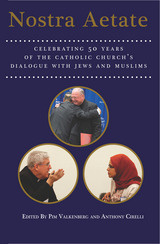
Nostra Aetate
Pim Valkenberg
Catholic University of America Press, 2016
The contents of this book originated in a conference at the Catholic University of America in May 2015. The essays and lectures contained within focus on the relationships of the Catholic Church with the other "Abrahamic" faiths, primarily Islam and Judaism. There is some discussion of the Asian religions as well. This volume, in structure, loosely follows the document Nostra Aetate itself. The first part of the book gives a broad view of the document and its importance. The following parts concentrates on the relationships between the Catholic Church and the Asian, Muslim and Jewish religions. The concluding section of the book surveys the reception Nostra Aetate received in various ecclesial and academic contexts.
[more]
READERS
Browse our collection.
PUBLISHERS
See BiblioVault's publisher services.
STUDENT SERVICES
Files for college accessibility offices.
UChicago Accessibility Resources
home | accessibility | search | about | contact us
BiblioVault ® 2001 - 2024
The University of Chicago Press









